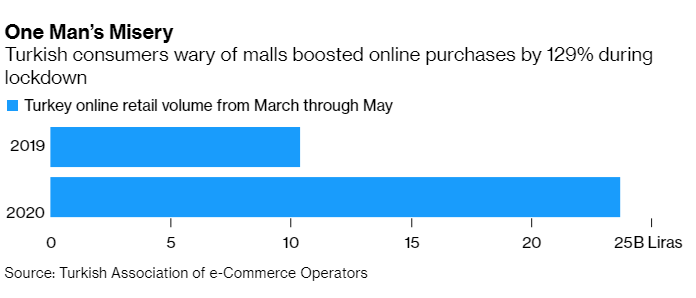Once the growth engine of Turkey’s $750 billion economy, consumers are setting their sights lower in the post-lockdown era.
After the coronavirus pandemic struck Turkey in mid-March, the government severely limited people’s movements at the expense of business activity, keeping most curbs in place until late May. The lifting of restrictions alone hasn’t been enough to bring the consumer economy back, while a second surge in new infections soon followed.

High-frequency indicators over the past few weeks gave a snapshot of an uneven and weak recovery even before new cases started to rise again in recent days. Lacking momentum, restarting the idled economy will be a challenge for Treasury and Finance Minister Berat Albayrak and his promises to deliver fast-track growth and jobs for the nation of 83 million people and around 5 million refugees.

Albayrak still maintains that positive growth is possible for 2020. By contrast, the median forecast in last month’s Bloomberg survey of economists was for a 3.6% contraction.
To jump-start activity, authorities have unleashed credit to the economy, with state banks offering negative real interest rates and long grace periods on new loans. Annualized lending growth is on track to set new highs after already hovering around 50%.

But figures that allow to track the economy in near real-time suggest Turkey has a long slog ahead as it winds up activity. After splurging in the early days of the Covid-19 pandemic, when people were hoarding basic goods and food, Turkish consumers began to dial back spending as job cuts or a policy of unpaid leave became common.
The rolling four-week average of credit card purchases — an indicator with a strong correlation to domestic demand — is barely catching up to levels seen a year earlier.

Data collected by Google show Turks have been reluctant to return to offices or go out and about even after restrictions were lifted from late May.

Much like elsewhere, online shopping has been one of the few bright spots in an economy reeling under restrictions on social mobility. Consumers wary of frequenting shopping malls leaned on e-commerce websites to shop for everything from basic needs to used cars.

Although online sales and credit card purchases appear to suggest a gradual revival in activity to levels seen last year, energy consumption is lagging far behind. One explanation is that most people employed in the services sector are still working from home, suppressing demand for refined fuel.

Plants and factories running at lower capacities are also eating into energy consumption. The current state of oil and power demand shows some sectors are more likely to be vulnerable to the lasting damage suffered by the economy even if the rebound were to continue despite the surge in new cases.
A resurgence of new coronavirus infections in Turkey could mean the threat is far from over.
Over 3,000 people tested positive during the weekend, the highest number in almost a month, following a period when authorities gradually reopened restaurants and cafes and resumed internal flights.
The increase in new cases is natural and doesn’t mean the reimposition of restrictions is inevitable, according to Tevfik Ozlu, a member of the top board of scientists advising the government on Covid-19 measures.
The daily number of new coronavirus cases in Turkey continuing to rise on Monday, weeks after the country relaxed restrictions.
Health Minister Fahrettin Koca on Monday reported 1,592 confirmed new infections over the previous 24 hours — 30 more than Sunday’s figure.
Koca also reported 18 new deaths due to the coronavirus, bringing the total to 4,825. Turkey has recorded a total of 178,831 infections.
At the start of June, the government authorized cafes, restaurants, gyms, parks, beaches and museums to reopen and eased stay-at-home orders for the elderly and young. Turkey’s media is rife with reports of people flouting social distancing rules and ignoring advice to wear masks in public places.
Koca tweeted: “If we altogether abide by the mask + distance rule we can control the spread.”
Meanwhile, Turkey began testing 150,000 of its citizens in all 81 provinces to determine how widely the coronavirus has spread among the population. Nationwide testing began on Monday, although pilot programs were already underway in some locations.
Excerpts from Bloomberg, ABC news
